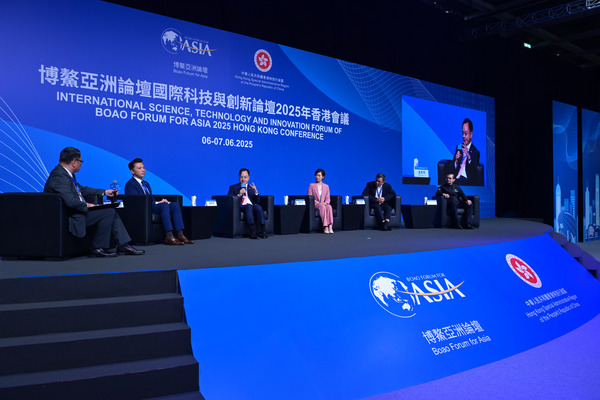
The Boao Forum for Asia’s International Science, Technology & Innovation Forum (ISTIF) was held in Hong Kong for the first time today and yesterday.
Held at the Convention & Exhibition Centre in Wan Chai and co-organised with the Hong Kong Special Administrative Region Government, the conference – themed “Transitioning Towards the Future: Powered by Science, Technology and Innovation” – attracted some 800 leading experts, academics and political and economic leaders from the Mainland and overseas.
The conference focused both on how to capitalise on Hong Kong’s unique advantage of being connected to the Mainland and the outside world and how to foster global co-operation in the field of innovation and technology (I&T).
During its Opening Plenary, Chief Executive John Lee outlined that under the “one country, two systems” arrangement, Hong Kong is the only world city that enjoys both the “China advantage” and the “global advantage”. He added that the city will take full advantage of its established tradition of the rule of law, its world-class universities and its robust intellectual property protection regime as it moves to become an international innovation and technology centre.
Highlighting that the world stands at a consequential crossroads in human history, Mr Lee said the convergence of artificial intelligence and health technology will lead to the next era of humanity’s evolution.
He remarked that innovation must be rooted in international co-operation, and in the open and free exchange of knowledge, talent and ideas.
In today’s Hong Kong Forum, themed “Leveraging the Advantages of Connecting with Both the Mainland and the World to Foster Global Innovation and Technology Collaboration”, renowned Hong Kong experts and political and business leaders from various fields, explored how the city can fully leverage its unique advantages of internal and external connectivity.
Secretary for Innovation, Technology & Industry Prof Sun Dong outlined that the Government has launched a series of robust policies to solidify Hong Kong’s research capabilities, accelerate the transformation of research and development outcomes, and promote the development of the technology industry.
Prof Sun explained that these policies are aimed at building a complete I&T ecological chain encompassing upstream, midstream and downstream sectors, and at promoting interactive collaboration across government, industry, academia, the research community and investors, to turn breakthroughs into impact and ideas into global solutions.

















